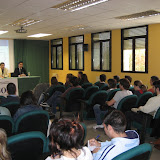Competing globaly with (poor) local resources
 Companies use resources (inputs) to produce products and services (outputs) that they sell to other companies or individuals (market) with the aim of obtaining a profit. Some of the resources used as inputs by companies are called commodities because anyone can easily be supplied with them at the same price, quality, etc. Nothing new here (I am not getting a tenure for this).
Companies use resources (inputs) to produce products and services (outputs) that they sell to other companies or individuals (market) with the aim of obtaining a profit. Some of the resources used as inputs by companies are called commodities because anyone can easily be supplied with them at the same price, quality, etc. Nothing new here (I am not getting a tenure for this).Other resources can not be taken for granted, they are the base of the competitive advantage of the company. These are for example, resources you manage to be supplied with and that your competitors can not get in the same conditions as you could. Your customers like this, (your great services) and that is the reason why the market lets you survive. Nothing new here either (Definitely I am not getting a Nobel in Economics for this).
Theoretically, commodities do not make a difference for a company, even less in the digital economy but the point is that, sadly, the place where a company is based can be a big threat for its competitiveness. The Open Economy lets competitors interact regardless their location, but reality is that companies are not competing in the same conditions when we look at what they call commodities at their locations.
Lets look at a few examples in the digitally-developed-world like UK, Germany or USA, that are a big deal for companies in countries with a brick-based-economy like Spain:
- Bandwidth is the more obvious one. Cloud computing advances and its amazing possibilities are based on the assumption that Mbits are free (as in beer, not as in speech), or at least, too cheap to meter. Sadly IaaS services will not take off in countries like Spain where traditional datacenter services never reached competitive scales.
- Brilliant engineers are also near to be a commodity in some locations, but as there are not many Stanfords and Silicon Valleys, innovative people tend to migrate to that places. Again, the breach will be deeper for companies located in small or medium cities like Valladolid.
- Ubiquitous network access: if you go a few Km away from the city and it is not possible to get a decent Internet connection then Information Society will not speak Spanish for decades. Of course your possibilities for working in mobility are really short as you can not be out of the office. (disclaimer: this post has been written over a GPRS connection with a lot of pain.)
Most of these resources are not very complex (not even expensive) to develop at a regional level and the impact in the local digital economy is huge. Some regions are understanding this and in a few years their companies will be nearer to be competitive in the global digital scenery. Unfortunately the region where I live and my company is based will not.
Until Spanish governments, no matter national or regional, get a better understanding of the Open Economy, reality is that good engineers will migrate, innovative companies will look for a better place to base their headquarters and innovation and internationalization will be only the buzz words in speeches during the global crisis.







